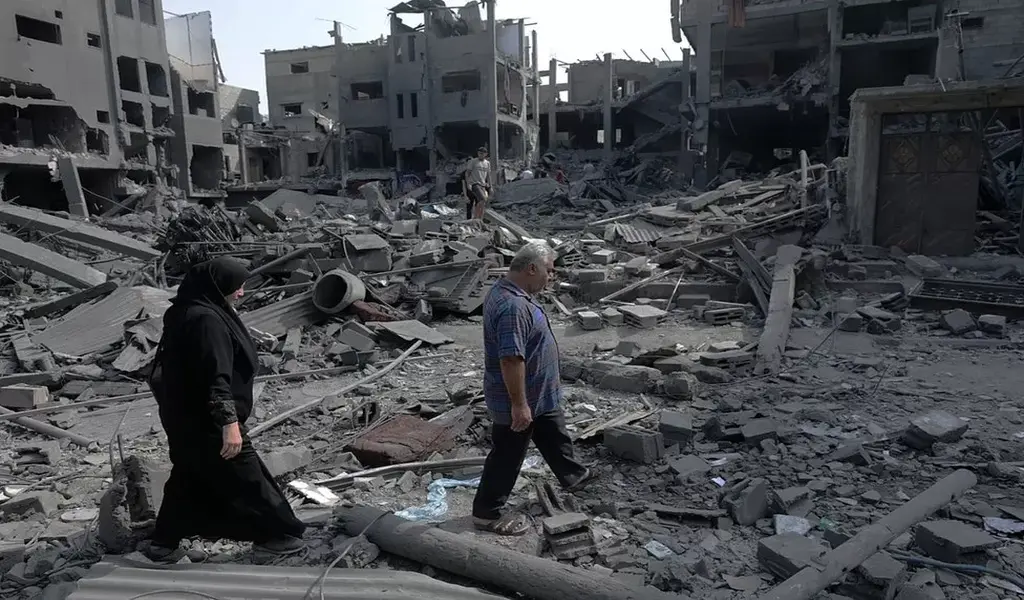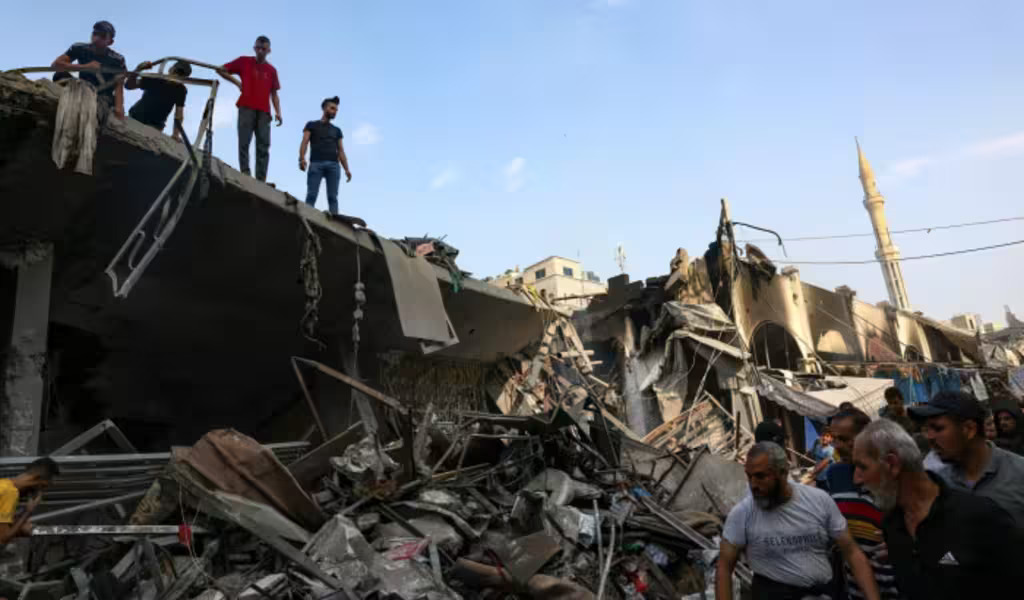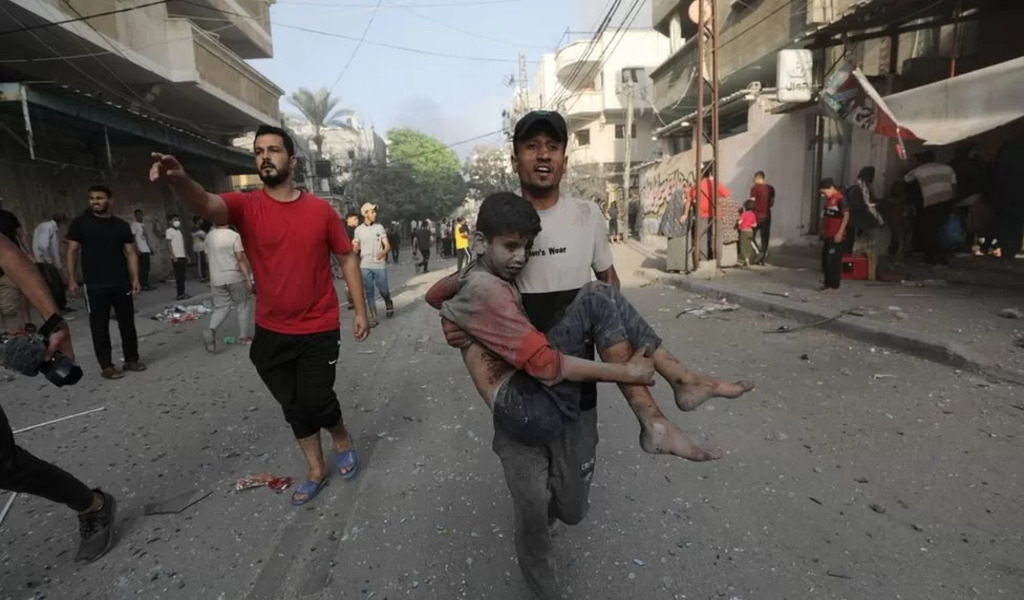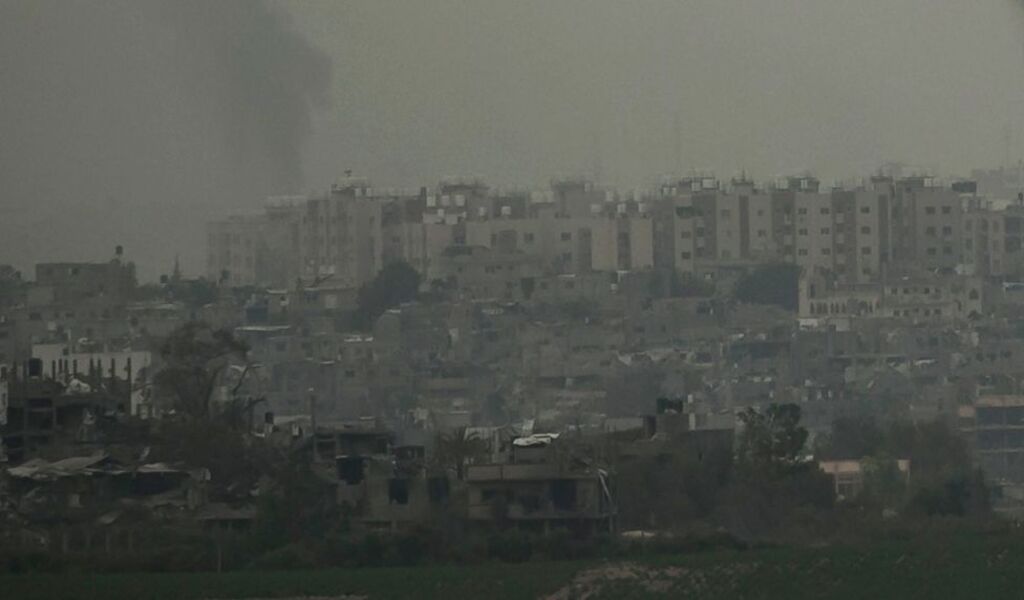News
Israel Launches Most Intense Night Of Airstrikes In Gaza Since Start of Conflict

(CTN NEWS) – Palestinians in the Gaza Strip have experienced the heaviest night of Israeli bombardment since the war with Hamas began three weeks ago.
Hamas-run authorities said hundreds of buildings were destroyed in air and artillery strikes, and that at least 377 people were killed in the past day.
Israel’s military said its warplanes hit 150 underground targets, including tunnels and other infrastructure.
Tanks and troops also went into the Strip and clashed with Hamas fighters.
The military said some soldiers would remain in the field, as Israel’s defence minister declared that the war had entered a “new phase”.
Speaking at a news conference on Saturday, Prime Minister Benjamin Netanyahu said Israel had entered the second stage of the war with Hamas.
He said additional Israeli ground forces have gone into what he called “that stronghold of evil” – referring to Gaza – to “dismantle” Hamas and bring hostages home.
“This will be a long and difficult war,” Mr Netanyahu added.
Israel began its bombing campaign in Gaza in response to an unprecedented cross-border attack by hundreds of Hamas gunmen on 7 October, in which 1,400 people were killed and 229 taken hostage.
Gaza’s Hamas-run health ministry says more than 7,700 people have been killed in the territory since then, and the UN is warning that a “humanitarian catastrophe is unfolding”.
On Friday night, the Israeli military conducted a powerful operation in various dimensions to advance the goals of the ongoing war, with ground forces expanding their operations.
During the same period, Palestinian mobile phone and internet networks experienced disruptions, severely limiting communication both within the Gaza Strip and the ability to report on the situation.
Hamas’s military wing, the Izzedine al-Qassam Brigades, reported clashes with Israeli troops in the northeastern town of Beit Hanoun and the central Bureij area.
They also launched a series of rocket barrages towards Israel.
On Saturday morning, Rushdi Abu Alouf, a BBC correspondent in the southern Gaza city of Khan Younis, described a chaotic scene on the ground.
He noted that the bombardment in northern areas was on an unprecedented scale, while there were fewer strikes in southern areas.
Panic spread among the hundreds of thousands of people sheltering in the south after Israel instructed residents in the north to evacuate their homes.
The Israeli military reported airstrikes on 150 underground targets in northern Gaza, which belonged to Hamas, an organization classified as a terrorist group by Israel, the UK, and various other countries.
These targets included tunnels, underground combat facilities, and additional subterranean infrastructure.
Later, Israeli Defense Minister Yoav Gallant declared that “last night, the earth in Gaza shook.”
He emphasized that the Israeli forces had attacked targets both above and below the ground, targeting terrorist operatives across all levels and in various locations.
Gallant made it clear that the operation would continue until further notice.
Gaza Civil Defense spokesperson Mahmoud Bassal informed AFP news agency that hundreds of buildings and houses had been entirely destroyed, with thousands of other homes sustaining damage.
He noted that the Israeli strikes had significantly altered the landscape in northern Gaza.
A video posted on Instagram by photographer Shehab Younis showed a severely wounded man being hastily evacuated from a building and placed in the back of a truck due to the unavailability of an ambulance.
In a voice note sent to the BBC, Younis described the situation as catastrophic, with people unable to contact emergency services because all means of communication had been disrupted.
William Schomburg, the head of the International Committee of the Red Cross sub-delegation in Gaza, provided harrowing insights into the dire healthcare situation in Gaza.
Hospitals have been operating ceaselessly to cope with the high number of casualties.
Schomburg stated, “I’ve been able to visit different hospitals, including the Al-Quds hospital, and the scenes there are difficult to describe.”
He recounted the challenging conditions faced by healthcare workers who are tirelessly treating the wounded, all while dealing with personal tragedies.
He shared the story of a doctor who had lost his brother and cousin the previous night.
Healthcare facilities have been forced to transform into shelters for displaced civilians, who believe that hospitals are the only safe places available to them.
The United Nations Relief and Works Agency for Palestinian Refugees in the Near East (UNRWA) is hosting more than 600,000 of the 1.4 million people who have been displaced from their homes.
The agency lost most of its contact with its teams during what it referred to as the “worst and most intensive night” of bombings thus far.
Juliette Touma, a spokeswoman for UNRWA, conveyed the immense challenges they are facing due to the disruptions in communications.
She reported that they had lost 53 colleagues and expressed fear that the number of casualties among their team might have increased as a result of the overnight bombardment.
Tensions have escalated in the Israel-Gaza conflict as Israel’s military operations continue against Hamas in the Gaza Strip.
Several factors are contributing to the intensification of this conflict, including the presence of Israeli hostages, the involvement of other governments, and the ongoing rocket attacks from Gaza.
The situation remains complex, and the outcome is uncertain.
The presence of Israeli hostages in Gaza has heightened the stakes in this conflict.
Many of the hostages are Israelis, but there are also a large number of foreign citizens and dual nationals among them.
This means that several other governments, including the US, France, and the UK, have a stake in the operation to secure their safe release.
The pressure to ensure the safety of these hostages is mounting, and it has become a critical aspect of this conflict.
French strategic specialist Col Michel Goya has pointed out that the Israel Defense Forces (IDF) face a difficult decision.
They must choose between sparing the lives of the hostages or launching an operation to inflict maximum damage on Hamas.
This decision is laden with moral, political, and strategic considerations.
Additionally, the families of those held in Hamas captivity have been making heart-rending appeals, adding to the pressure on Israel’s leaders.
The emotional toll on these families and the broader Israeli public cannot be underestimated.
Another important aspect is the historical context.
In 2011, Israel exchanged more than 1,000 prisoners for the release of a soldier, Gilad Shalit, who had been held by Hamas for five years.
However, the consequences of that swap are still felt today.
One of the men freed in that exchange, Yahya Sinwar, has since become the political leader of Hamas in Gaza.
This complicates Israel’s approach to future large-scale prisoner exchanges.
The regional dynamics and how Israel’s neighbors respond also play a crucial role in the conflict’s duration and outcome.
Egypt, in particular, is a key player.
The Rafah border crossing between Egypt and Gaza has become a humanitarian focal point, with limited aid entering Gaza.
Foreign nationals and Palestinians with foreign passports are trying to leave Gaza, adding to the complexity of the situation.
Egypt faces international pressure to be seen as supporting the Palestinians in Gaza, but it has been cautious about letting a mass influx of Gazans into northern Sinai.
Jordan’s King Abdullah has also set clear red lines, emphasizing that Palestinian refugees should not be pushed out of Gaza into neighboring countries.
Israel’s northern border with Lebanon is under close scrutiny, with potential risks of cross-border attacks by Hezbollah.
Iran, the main sponsor of Hezbollah, is also making threats against Israel and is the focus of international concern.
The US has deployed military assets to the eastern Mediterranean in response to these threats.
The situation in Gaza is further complicated by the potential consequences of significantly weakening Hamas.
Israel withdrew its army and settlers from the Gaza Strip in 2005 and has no intention of returning as an occupying force.
A power vacuum or the rise of other groups could pose new risks and challenges.
There’s also the question of what might replace Hamas if it were to be significantly weakened.
One possibility is the gradual return of the Palestinian Authority (PA) to Gaza.
The PA currently controls parts of the West Bank, but it is weak there, and reconciliation and governance in Gaza would be highly complex.
The international community may need to provide an interim solution, as it did in Kosovo when the UN ran the region after Serbian forces withdrew in 1999.
However, it’s important to note that the UN is widely mistrusted in Israel.
Another option is to create an administration in Gaza run by local mayors, tribes, clans, and non-governmental organizations, with involvement from Egypt and the US, as well as other Arab states and the PA.
This approach could help stabilize the situation and rebuild Gaza’s devastated infrastructure.
Israel will likely insist on even tighter restrictions on “dual-use goods” entering Gaza and might call for an expanded buffer zone along the fence with Gaza to enhance the protection of Israeli communities.
In any case, Israel will seek to ensure that a similar attack does not happen again in the future.
The situation is complex, and the outcome remains uncertain.
MORE RELATED NEWS:
3 Palestinian Men Killed in West Bank Overnight, Totaling 114 Since October 7
Canada’s intelligence tells another Sikh leader that India wants to kill him
Increased Risk of Israeli War Crimes due to Gaza Communications Shutdown




























